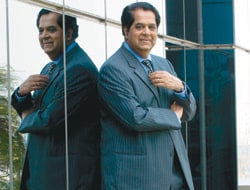
The Boom Banker
In just under 13 years as CEO and MD, K.V. Kamath transformed ICICI from a development lending institution into a dynamic universal bank. As he vacates the post, he leaves behind a controversial legacy. Indrajit Gupta catches up with him
Mr. K. V. Kamath, it was a wonderful innings. What happened in the end?
The strategic imperative when I came on board ICICI was very clear. It was to diversify the business, get in capital and get the right products for diversification. What we have done is relentlessly focused on that. When you do that, there will be certain elements which have swings. You recognise that well on day one. When I look back and say would I redo anything, there
is nothing I would redo. I would do it in the same sequence and if the global situation was the same, the same outcomes would be there.
The market started punishing your stock. Why?
I don’t think that these things are really well understood. I think emotion is what is behind this and a company cannot be run on emotion. I have to look at whether the basics are right or wrong. That’s the way we would run business. Otherwise you cut out everything and become a very narrow, local bank. It was neither our purpose nor that of anyone else.
ICICI grew fast. Were the risk controls in place to match the speed?
I think risk controls were in place. If you look at where the challenges are, it is clear where they are. We have a very large customer base. We have had challenges in our retail end basically in our ability to collect and I don’t want to comment on that but the bank is not able to collect. And if we cannot collect, we should exit that business and that is where we are with certain unsecured lendings. That is not because of any lapse or because of wrong customer selection. That challenge is for everyone.
If you look at certain parts of the business – derivatives, international business – you created a hard charging culture. Was that desirable?
You can always question whether the speed of execution was right or wrong. I guess there is only a partial answer to that. The fundamental question is that all the businesses that I got into, would I not go into them now? Answer is I would have gone into all those businesses. If course correction was required, like say in rural, then we will do it.
But did the aggressive culture leave you comfortable?
Years back, I actually did a workshop with a young group of people. I asked them to describe to me how others see ICICI: Number 1 was aggression. Then I asked them a question: Do you think they see it in a positive way or negative way? Large number of people said “in a negative way” because of their personal level interaction. There are lots of attributes, around 20-25 attributes, both positive and negative. I repeated the exercise with a whole bunch of staff going through senior levels. I got fairly consistent results. Then I told Ram [HR head] that this is something he needs to see. He then started working on this whole thing of being seen as aggressive. We are conscious of that. That is part of what I call culture that had to be corrected, you have perceived rightly or wrongly as aggression, and I take it as my job to correct it. That correction was made by the team, in the act making sure that we achieve that. I guess that the message has hit home.
The Man:- K.V. Kamath
Title: Stepped down as CEO and MD of ICICI, currently non-executive chairman
Age: 61
Career: He began his career in 1971 at ICICI. In 1988, he moved to the Asian Development Bank. He returned to ICICI as its CEO in 1996
Education: He has a degree in mechanical engineering and an MBA from IIM, Ahmedabad
Interests: Business books, old Hindi film songs and Formula 1
(This story appears in the 30 November, -0001 issue of Forbes India. To visit our Archives, click here.)





